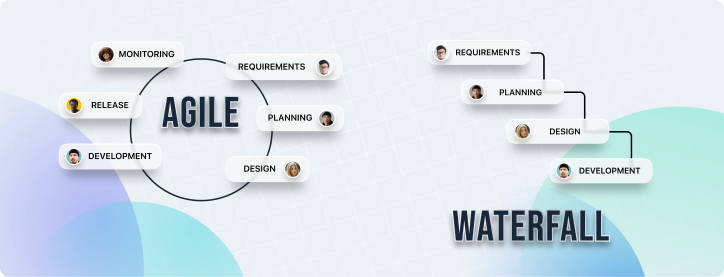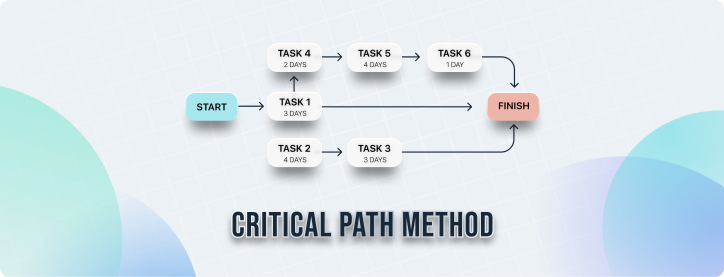When it comes to the merits of project management methodologies, people working in this area often disagree. Someone believes that for the success of the final product, constant communication between the customer and the performer is enough, and the methodology is a secondary thing. You can also hear the opposite opinion: without a methodology, chaos will swallow even the coolest ideas.
The truth, as always, is somewhere in the middle and is that the team needs to find a methodology, adapt it and get the most out of its use. By the way, 39% of companies surveyed by Hubstaff in 2021, said they have implemented hybrid project management practices. Therefore, we will talk about the advantages and mportance of project management methodology as such.
The success of using the methodology in the project largely depends on the discipline in the team and a firm intention to follow the rules.
Another important point is that before choosing a methodology, you need to carefully understand what the ultimate goal of the project is. Flexible and active communication between customers and performers is very important here. If the communication resulted in clear requirements for the project, you can proceed to the methodology.
What is a Project Management Methodology and Why is it Important?
The project management methodology is a system that allows you to reduce risks, optimize the efforts, avoid duplication and bring mutual understanding to a new level in the team. The main components of the methodology are the principles, methods and rules of working on the project.
Answering the question, what is a project methodology, we can say that it is a structure that helps to manage the project in the best way and ensure the maximum productivity of the people involved. If we talk about the methodology within the company, it provides the standards, templates and guidelines for the routine actions required in most projects.

In addition, the methodology adapted to the company’s work style eventually becomes a kind of basis for all future projects and simplifies all stages of their life cycle.
Methodology helps to save resources. For example, you will go through initiation and planning faster, reduce the time to train employees, etc.
Thanks to the methodology, your business will:
- avoid mistakes made in the last projects;
- constantly grow;
- have common understanding of processes, responsibilities, roles etc;
- eliminate the influence of the human factor;
- be ready to solve complex tasks and problems.
In short, the importance of the project management methodology is that it helps to avoid most of the unpleasant surprises that can be found on the way to success. Therefore, we can surely say that the importance of the project management methodology is great, and there are many more valid pros than cons. Below are some specific advantages.
15 Benefits of Project Management Methodology and How They Influence Work Efficiency
Each company will notice its own advantages from using the methodology, but we will talk about the most common ones.
- Creating a culture of successful project management. It is the methodology that can be the basis for it. That is, the best practices that produce results will be clearly described in the company. Instead, it will be clear which actions should be avoided.
- Clear definition of roles. It often happens that not all people involved in the project understand the roles and responsibilities. This especially applies to top managers, whose area of responsibility may remain almost a secret for subordinates. The methodology makes all this transparent.
- Basis for taking into account the experience of colleagues. When a company does not have any methodology, or has several, it is difficult to share experience in such a way that it can be systematized and used in the future. With a methodology, you can optimize this process and benefit from it.
- The growth of the general quality level. From time to time situations occur when the success of the project is due to a good coincidence, high qualification of one of the employees, great enthusiasm etc. When these are isolated cases, you should not sound the alarm. But if such not-so-predictable factors are relied on company-wide, something is wrong with the business, it needs a predictable methodology.
- No regular “reinvention of the wheel”. When teams do not share the experience as mentioned above, it often happens that you have to look for answers to questions that someone has already found. It is in the methodology that the basic “wheels” should be described.
- Predictability of results. When the team has standards, it is possible to clearly define the terms and deadlines. They can be announced to customers or other interested parties. If you strictly adhere to the methodology, you can finish the work even earlier than planned, which will pleasantly impress the participants.
- Making effective decisions. When all parties understand the roles and areas of responsibility, goals and tasks, ways of progressing, then decisions are made without any information shortage. Therefore, they are more balanced and correct. Also, the methodology usually states who makes decisions, so if an error occurs, it is clear who is responsible. Therefore, it will not be possible to delegate it.
- Increasing the team’s motivation, followed by increasing productivity. When the project has a minimum of unpleasant surprises, the goals are clear, as well as the ways to achieve them, people work with greater pleasure. The work that brings positive emotions automatically becomes more efficient than work that causes negativity.
- Rapid growth of the qualification level of project managers. When teams work within a methodology, it is much easier for managers to interact with them and grow professionally. After all, you don’t have to spend a lot of time finding life hacks that will simplify coordination. A project management methodology gives them a holistic understanding of the project. This allows deeper understanding of processes.
- Understandable and controlled use of resources. The methodology allows from the very beginning to define the scope of work to be performed and the resources required for it. If anything goes wrong, it will become clear very quickly.
- Adequate risk management. Usually, the methodology describes risk prediction algorithms and actions to manage risks. In addition, the methodology has clear requirements for communications, which means that all interested parties will know about the risk in a timely manner.
- The customer understands what he will get as a result. When there is no methodology, there is no guarantee that the requirements have been recorded correctly. Therefore, the client often has no confidence that he will receive exactly what he expected. When you work within the methodology, the customer and the executor agree that they understand the task in the same way.
- Problems in the project can be noticed earlier. When you have control metrics, projects with defects become visible immediately. So there is time to fix what went wrong.
- Possible investment areas become clear. For example, you may not have enough tools for effective remote work. Funds invested in them will bring tangible results.
- The business will transfer from authoritarian management models to democratic ones. As we wrote above, roles and responsibilities are usually clearly defined in the methodologies. Therefore, employees understand what is expected from them and feel responsible for it. And they also know what their colleagues should do. Due to this, the level of uncertainty in the team decreases, as well as the number of conflicts.

Ways to Use Methodology
There are many project management methodologies, and even more hybrid options. Therefore, before choosing one of them, answer the following questions:
- Has the team used any methodology in the past? If so, how successful?
- What is the team structure? Are there remote workers, outsourced?
- How fixed or flexible are your customers’ requirements?
- What is more important: getting a quick result or quality?
- Is it possible to increase the budget if necessary?
- How strict should the requirements be? Are there opportunities for experimentation?
- How many stakeholders are there in the project? How open are they to communicate?
You should also consider the type the future project manager belongs to:
“Performers” work well within the current business strategy, looking for employees who will help solve problems and move in a certain direction. They do not look for new opportunities for development that contradict what has happened in the company so far.
“Experts” can look for new options for business development, relying on the previous experience of the company, reliable research, etc. They consult authoritative colleagues.
“Players” are ready to look for opportunities where they are not seen by analysts, as well as where there is no proven experience with reliable numbers. Sometimes their proposals fail in terms of payback, but the opposite also happens.
“Prophets” have a broad outlook, often seeing opportunities for growth where others don’t. They are ready to radically change the orientation of work. Often their words have to be taken at face value, because there are no figures or studies that confirm them.
It is also very important to understand the features of popular project management approaches.
Waterfall
The most traditional approach, with tasks performed sequentially. That is, to start a new stage, you need to finish the previous one. Previous stages are not analyzed, so global errors can be noticed at the final stage of work, when it is possible to correct them only by investing a lot of money and time.
This methodology should be chosen when everyone is sure of the requirements, almost nothing will change, there is an opportunity to draw up a detailed work plan, and the documentation needs to be detailed.

Agile
The main difference between this methodology and the previous one is that the team can change something in the project at intermediate stages.
Scrum, eXtreme Programming (XP), Kanban and Scrumban are variations of Agile.
This methodology should be chosen when customers are ready for a dialogue, but are not sure what they want to get as a result. This methodology is suitable for those who want quick, not ideal results. Detailed documentation and clear deadlines are not provided here.
eXtreme Programming, XP
It is another agile methodology with the features like simplicity, communication, constant feedback, respect and courage.
This methodology should be chosen when your team works together, no remote work, and collaboration is one of your priorities.
Critical path method
In this methodology, the main attention is paid to finding the key tasks which result in quick and high-quality completion of the project. You need to calculate the longest time required to complete the key tasks. It will be considered a critical path.

This methodology should be chosen when the project is complex, large-scale, with many dependencies, but there is a clear plan and the team’s tendency to work according to algorithms.
So, we explained what the project methodology is and considered the advantages of using the project management methodology. The main thing is to understand that there are many methodologies, and hybrids are also worth considering. Therefore, determine your main goals, based on them, choose a methodology and adapt it to yourself, build an action plan and move towards success.
